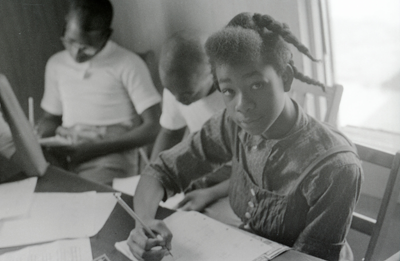

Mississippi Freedom Schools (1964)

In the summer of 1964, volunteers from around the United States came to Mississippi to take part in Freedom Summer, a civil rights campaign with two primary goals. The first goal was to register as many African Americans to vote as possible (only 7% of eligible African Americans in Mississippi were registered to vote at the time), and the second goal was to establish educational programs for school-aged children.
Freedom Summer was the brainchild of the Council of Federated Organizations, which encompassed four civil rights groups – The Congress of Racial Equality, Southern Christian Leadership Conference, Student Nonviolent Coordinating Committee, and the National Association for the Advancement of Colored People.
For the educational initiative of Freedom Summer, “Freedom Schools” were established all over the state. According to the “Prospectus for a Summer Freedom School Program” submitted by Charles Cobb, the goals of the Freedom Schools were to:
- “Supplement what they aren't’ learning in high schools around the state.
- Give them a broad intellectual and academic experience during the summer to bring back to fellow students in classrooms in the state.
- Form the basis for statewide student action such as school boycotts, based on their increased awareness.” [Kathleen Dahl Freedom Summer Collection (M357)]
The curriculum and lesson plans reflected these goals and included education in the areas of:
- “Supplementary education, such as basic grammar, reading, math, typing, history, etc. Some for the already-developed programmed educational materials might be used experimentally.
- Cultural programs such as art and music appreciation, dance (both folk and modern), music (both folk and classical), drama, possibly creative writing workshops, for it is important that the art of effective communications through written word be developed in Mississippi students.
- Political and social studies, relating their studies to their society. This should be a prominent part of the curriculum.
- Literature.
- Film Programs.” [William “Bill” McAtee Civil Rights Collection (M581)]
The impact of the Freedom Schools was immediate, and the schools were popular with both children and adults. After Freedom Summer, many of the students who attended the schools became active in the civil rights movement, and their activism had far-reaching impact in the state and region.
In 1965, Lyndon B. Johnson signed the Elementary and Secondary Education Act, which included federal funding to start Head Start, an early education program. As Ida Ruth Griffin, a former Freedom School student, remarked, “The Freedom Schools brought about the Head Start for black children. Most of the people that were Freedom Riders were the ones who originated Head Start.” It was common for Freedom School attendees or teachers to serve pivotal roles in establishing Head Start programs around the state. As Mississippi activist Owen Brooks stated, “They [Head Start and the freedom movement] had to come together at some point because they were the same people.”
To search the civil rights collections at the University of Southern Mississippi, go to the Digital Collections.
For more information, contact Jennifer Brannock at or 601.266.4347.
References:
McAdam, Doug. Freedom Summer. New York: Oxford University Press, 1988.
William “Bill” G. McAtee Civil Rights Collection, M581, Historical Manuscripts, Special Collections, The University of Southern Mississippi Libraries.
Kathleen Dahl Freedom Summer Collection, M357, Historical Manuscripts, Special Collections, The University of Southern Mississippi Libraries.
Joseph and Nancy Ellin Freedom Summer Collection, M323, Historical Manuscripts, Special Collections, The University of Southern Mississippi Libraries.
Hale, Jon N. The Freedom Schools: Student Activists in the Mississippi Civil Rights Movement. New York: The Columbia University Press, 2016.
Herbert Randall Freedom Summer Photographs, M351, Historical Manuscripts, Special Collections, The University of Southern Mississippi Libraries.
Watson, Bruce. Freedom Summer: The Savage Season that Made Mississippi Burn and Made America a Democracy. New York: Viking, 2010.
The lead image is from the Herbert Randall Freedom Summer Photographs (M531-467).
Text by Jennifer Brannock, Curator of Rare Books & Mississippiana.